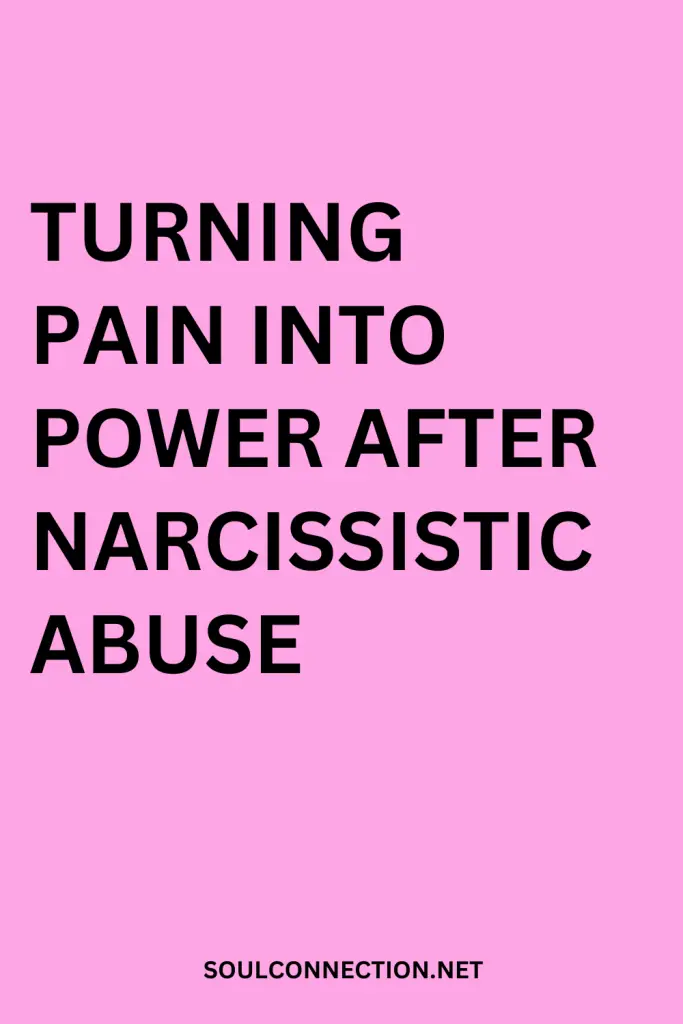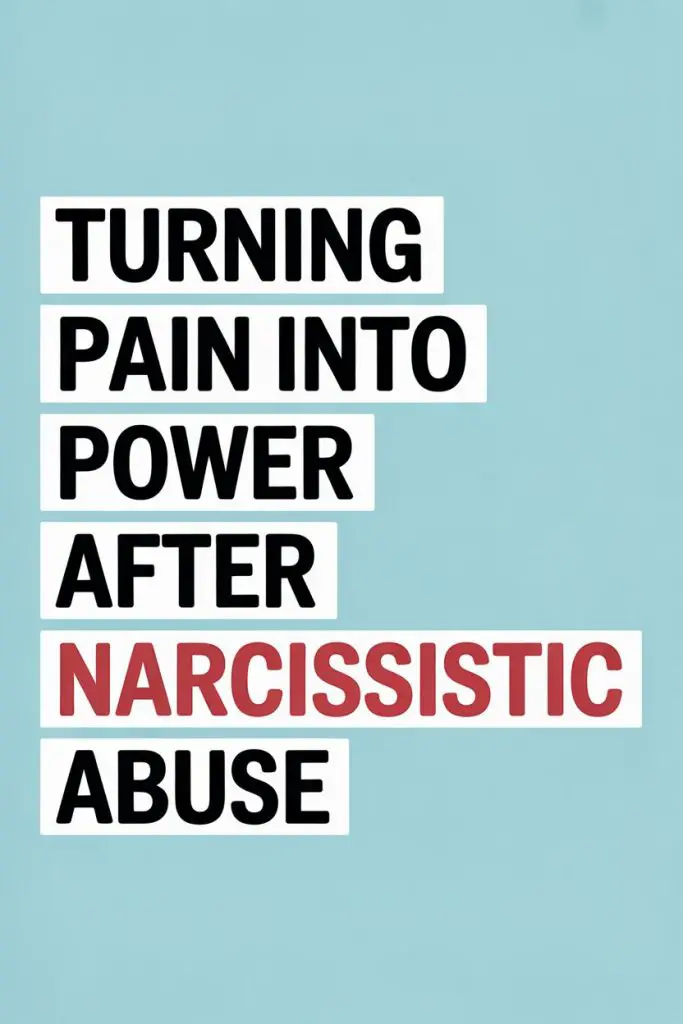Some experiences leave bruises you can’t see, but boy, can you still feel them.
Surviving narcissistic abuse is a bit like surviving a tornado: everything’s upside down, you’re not quite sure where your shoes went, and you’re left with rubble where there used to be a living room.
But here’s the twist: your pain isn’t a life sentence. It’s raw material.
There’s real power in those broken pieces—yes, even the ones you’d rather shove under the bed and pretend aren’t yours. Ready to find out how?
Recognizing Narcissistic Abuse for What It Was
It’s easy to doubt yourself after a relationship with a narcissist. Gaslighting has a way of making you question your own memories (Was I too sensitive? Was I really the problem?). Spoiler: you weren’t.
Identifying what happened—naming it, out loud—rewires your brain’s panic room. Terms like gaslighting, love-bombing, triangulation, and flying monkeys aren’t just psychological jargon; they’re flashlights in the dark.
When you understand the mechanics of narcissistic abuse, you realize: it wasn’t you. It never was.
You don’t have to become the world’s leading expert on narcissism, but knowing the basics helps you stop blaming yourself and start re-building some well-deserved self-compassion.
Grieving the Illusion
Turns out, you weren’t just mourning the relationship; you were mourning what you thought it could be. Narcissists are master illusionists, and the version of your ex you fell for?
That was the opening act. The real person came out after the intermission, and the show got a lot less fun.
It’s normal to feel angry, heartbroken, or just plain foolish. Who wouldn’t? There’s grief when the curtain drops, but here’s the refreshing part: only real, honest grief clears the stage for something new.
Cry, journal, eat ice cream for dinner—whatever your flavor. Just don’t skip this step and try to “positive vibes only” your way past it. Healing likes to take the scenic route.
Rebuilding Your Sense of Self
Think back to who you were before the narcissist made off with half your wardrobe—and all your confidence. Maybe you can’t quite remember that person. That’s not a sign you’re lost; it’s proof you’re still in motion.
Narcissistic abuse erodes boundaries, self-esteem, even your hobbies. The narcissist didn’t like your love of baking? Get back in that kitchen and whip up something glorious (bonus points if it’s messy and indulgent).
Revisit music, books, or friendships that fed your soul before everything revolved around their ego.
Sometimes rediscovering yourself feels like thumbing through an old photo album: “Oh, right! I did used to love spontaneous road trips!” Try something small and new.
Give yourself permission to experiment. If you’re waiting for permission from someone else (like you always did before), this is your sign.
Protecting Yourself With Boundaries
Boundaries are your best mates now. They might feel uncomfortable, especially if you’ve spent years with someone who bulldozed right over them with a smile.
But boundaries aren’t walls—they’re more like velvet ropes. They say, “This is my space. You’re welcome here, but only if you respect the rules.”
You’ll probably feel guilty using them at first, especially with people who remind you of your ex (hello, the world is full of them). That’s okay. Guilt is just growing pains for the newly empowered.
Start small. Maybe you only answer texts when you feel like it. Maybe you stop explaining yourself to people who don’t deserve an explanation.
It gets easier. And soon, boundaries stop feeling like a punishment for others and start feeling like a gift to yourself.
Finding Your People
Narcissistic abuse is isolating by design. The narcissist wants you cut off from anyone who might point out the emperor’s lack of clothes. Now’s the time to rebuild your village.
Reach out. Call that friend you lost touch with. Join a support group—in-person or online—where you don’t have to explain why you stayed, or why you left, or why you still sometimes miss them. These are people who get it.
A good therapist (the kind who recognizes narcissistic abuse) is worth their weight in chocolate. But don’t underestimate the power of a “me too” from someone who’s walked the same path.
Redefining Your Relationship With Love
Narcissistic abuse warps your idea of love. It teaches you that love is conditional, that your worth depends on someone else’s mood, and that relationships are about proving yourself. Time to flip that script.
Start with self-love. Not the Instagram kind with bubble baths and “treat yourself” hashtags (though go wild if that helps).
Real self-love involves self-respect and self-trust. It’s the quiet voice that says, “I matter, even when nobody’s watching.”
Healthy relationships don’t keep you guessing. After narcissistic abuse, you might find genuine kindness suspicious. (Why is he being so nice? What’s her angle?)
Allow yourself to notice, and gently challenge, these thoughts. Love doesn’t have to be a rollercoaster.
Channeling Pain Into Purpose
You survived something that would have flattened most people. That’s not just resilience; that’s gold.
Many survivors find meaning in helping others—writing, speaking, volunteering, or just being the friend who says, “You’re not crazy. I’ve been there.”
Maybe your story is yours to keep. Maybe you want to shout it from the rooftops. Either way, your pain can become fuel.
Some people start passion projects, others finally write that novel, some just throw themselves into living with a little more gusto than before. Take your pain and use it as fertilizer—messy, but magic happens.
Reclaiming Your Voice
Narcissists silence. Survivors roar (eventually).
Notice how your opinions and preferences come back online. You have the right to speak up about what you want for dinner, what you think about the movie, what boundaries you need in your next relationship. It’s not selfish. It’s practice.
Start small if you need to. Practice saying no. Practice saying yes, too. Your voice doesn’t need to be loud to be powerful. Sometimes it just needs to be heard—by you.
Learning to Trust Again
Trusting again—yourself, others, the universe—is a tall order. Narcissistic abuse teaches you to second-guess everything, including your own intuition. But your gut isn’t broken, it’s just been muffled.
Notice those hunches. Trust your discomfort. If someone feels off, you don’t owe them endless chances to prove you wrong. The best part? With practice, you become your own best detective.
And when you choose to trust, it’s because you want to, not because someone pushed you into it.
Watching Out for Old Patterns
Healing isn’t a straight line. Old habits sneak up when you’re tired, lonely, or just feeling nostalgic for the days when things made (a little) more sense.
You might notice yourself slipping into people-pleasing, ignoring red flags, or accepting less than you deserve. That’s human.
Catch these patterns with curiosity, not shame. “Ah, there’s that old tune again. Interesting. What if I tried a different dance this time?”
Each time you redirect, you reinforce new, healthier grooves in your brain.
Allowing Yourself Real Joy
After narcissistic abuse, joy can feel like a foreign country where you don’t speak the language. Take the trip anyway.
Joy isn’t selfish. It isn’t proof you’ve forgotten what happened. It’s what helps you remember who you are—someone who laughs, who loves, who deserves to take up space.
Let yourself feel it, even if it’s fleeting. Even if it’s just a good cup of tea or a silly meme that makes you snort-laugh. The more you allow those moments, the more they grow.
Growth Looks Good On You
Healing from narcissistic abuse isn’t about erasing the past or pretending you were never hurt. It’s about picking up the shards and building something stronger, something that belongs to you.
You’re not the person you were before—and that’s not a tragedy. That’s transformation, with all its messy, beautiful edges.
Your power was never lost; it was waiting for you under the rubble.
Take it. You’ve earned every bit.


